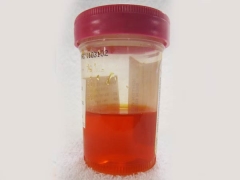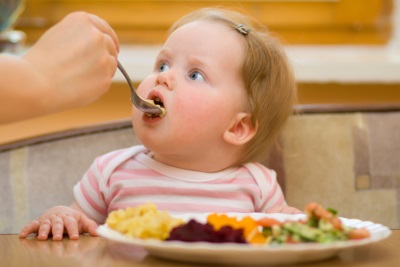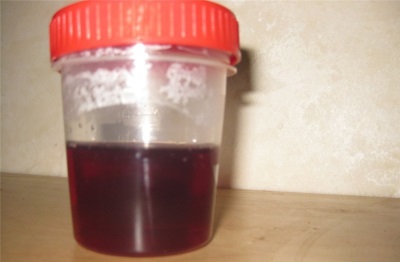Red urine in a child
The state of the child's urine helps to determine whether the baby is healthy or should be shown to the doctor immediately. Parental anxiety always causes a change in color, especially if the color suddenly turns red. This suggests the appearance of blood in it, but not only bleeding can result in a red color. Why can the baby's urine turn red and what should the parents do in this case?
The reasons
Acquisition of urine red color may be caused by:
- Eating food with red pigments.
- The use of drugs.
- Excessive excretion of urate with urine.
- Injuries to the organs of the excretory system.
- Inflammatory diseases of the bladder or kidneys.
- Urolithiasis.
- Blood coagulation disorders.
- Acute infectious processes.
- Strong physical exertion.
Have a newborn
The red tint of the urine of an infant, who was just born, is normal and is associated with the nutrition of the baby colostrum, in which there is very little water. This causes excessive excretion of urates in the urine of the newborn, which cause the red-brick shade. The condition is called uric acidic infarction, but this name should not frighten parents.
On the second or third day of life, the color of the urine becomes pink, and after a few days it acquires the usual yellow tint, or even it becomes colorless.
Have baby
A common cause of redness at this age is the introduction of complementary foods. If a baby toddler has tried beets, blueberries, red peppers, blackberries or other products that can color urine, you should not worry. Pigments from these products will change its color for a short time.
In addition, redness of the urine of an infant may be associated with the use of drugs and diseases with intoxication. However, it is often also a sign of blood ingress into it, so redness should always attract the attention of parents and be a reason for a baby to be examined by a doctor.
In older children
Redness of the urine of an older child is associated with urinary tract infections, excessive exercise, medication, injuries, and changes in diet.
If the child’s menu contains a large amount of red pepper, beet dishes, red berries, rhubarb, the urine becomes red due to the pigments in these products. Also, such a change may be caused by the child's use of sweets with a red dye.
Why is it dark red?
Dark red, almost brown color of urine appears due to blood entering it from the kidneys. The cause may be glomerulonephritis, kidney tumor, urolithiasis or pyelonephritis. Also darkening can be caused by hepatitis.
How to determine if the urine is red with blood or beets?
First of all, you need to evaluate whether the urine is cloudy. If turbidity is present, then most likely the redness is caused by the ingress of blood. After eating beets, although it will turn red, it will remain transparent.
Next, you should pour a little soda into a sample of red urine, then pour a little table vinegar. If the appearance of a red tint was caused by dishes with beets, the addition of soda will remove the red color, and when vinegar is added to it, the redness reappears. If the cause is bleeding, neither soda nor vinegar will affect the stain.
What to do?
If parents notice that the urine of the child has acquired a red hue, you first need to analyze whether such a change is related to food or drugs. To exclude diseases of the excretory system, a baby will be assigned a urine test. In addition to the general study, can be assigned Nechiporenko tests or Kakovsky Addis.
Also, the doctor will recommend an ultrasound study of the kidneys and bladder. A blood test will also help determine whether the baby loses red blood cells in the urine, and after the coagulogram is performed, it will be possible to make sure that there are no violations of the coagulation system. In some cases, the baby may be referred for X-ray, cystoscopy or tomography.












